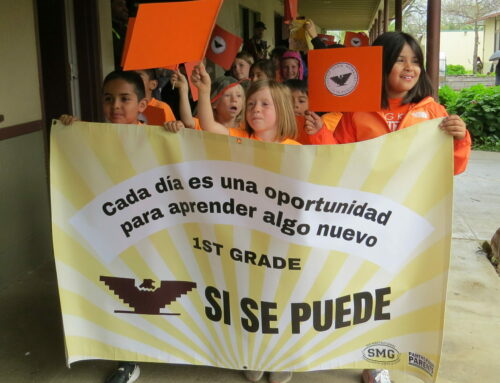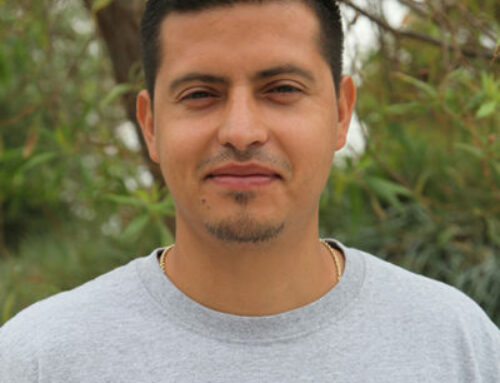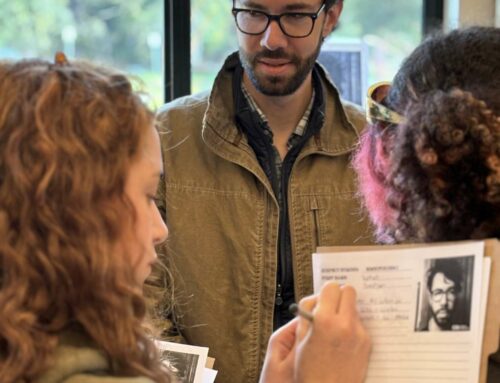Students gain a sense of hope at annual fall conference
Published in the Oct. 29 – Nov. 11, 2014 issue of Morgan Hill Life
By Marty Cheek

Photo by Marty Cheek
Dr. Francisco Reveles speaks to students and parents at the Oct. 11 ‘No Excuses’ conference.
For many Morgan Hill students who might be the first in their families to have the opportunity to go to college after high school graduation, the process of applying for a four-year university can seem like a daunting and intimidating task. With Project Roadmap and its “No Excuses Conference” held every fall for the last four years, students and their parents discover that getting into a university is not an unattainable goal.
Many of the students who attend the No Excuses Conference find that they have a greater goal about getting into a university, said Dr. Francisco Reveles, a speaker at this year’s conference which was held at Live Oak High School Oct. 11. They want to succeed for the sake of their family and parental pride, he said. That’s why parents need to play an active role in encouraging their children to not give up their hope in gaining their goal of a higher education.
“I do a lot of research on resilience,” Reveles said. “Also my own upbringing was pretty rough. So what allows people to move forward is that they go from a comfort zone to a growth zone. Life, destiny will pull you, and it involves risk taking. It involves dealing with our own fears and anxieties. And one of the key things about this conference — and it’s a beautiful conference — is that it instills a sense of hope. There are a lot of role models here.”
The conference brings in students who have graduated from high school and gone to college. They tell the high school students how they got through the complex process of applications. Telling the students the specifics about what they need to do is a critical component of the conference, Reveles said.

Photo by Marty Cheek
Morgan Hill School Board Trustee Claudia Rossi speaks to students and parents about college during the Project Roadmap conference.
“All the students who are here, most of them are bilingual, they’ve had to be the movers and shakers of their families and take care of their siblings, their younger ones,” he said. “That gives them a sense of maturity that’s way beyond their years and those are assets. They can navigate. It’s about hope, moving forward, identifying the assets, but also challenging them.”
Among the Project Roadmap students who gave workshop presentations at this year’s conference was Max Banuelos, a Sobrato High School senior.
“Both my parents (Mario Banuelos and Fawn Myers) are really involved in Project Roadmap,” he said. “I’ve attended most of the No Excuses Conferences. I used to be just an audience member, kind of taking it in, but this year as a senior, I’m helping with the college searching and how to start that process.”
The information that high school students gain from the conference can help them build confidence as they take the necessary steps to get into a university after graduation, he said.
“College can be really confusing,” Banuelos said. “There’s a lot of steps and if you’re not careful and miss one of those steps, it’s really difficult to get through the process. So No Excuses kind of means that there’s no excuse, since it’s available, people should learn the success steps so they can succeed.”
He encourages parents to attend the conference with their children because they play a crucial role in helping in the college application process.
“It’s a confusing time for your kids and it’s important for the parents to know what is happening in order to give the support kids need to understand what is happening,” he said.
Donna Foster Ruebusch, a retired Live Oak High School teacher, attended the opening keynote speech by Reveles at this year’s conference and encourages middle and high school students and their parents to attend.
“The earlier you begin to speak to children about the opportunities and the more information you give their families, they can choose the course work that can lead them to their desired course of study,” she said. “It also takes away some of the scary aspects of the process, such as how to fill out an application, how to go online and find the resources. The more that people hear about it, the more they understand that it’s not an impossible task.”
Latino students who might have English as their second language can especially feel the intimidation of going through the process of applying for college, Foster Ruebusch said, but the Morgan Hill Unified School District offers excellent resources to give them help to find their way through the application maze.
“At every one of our school sites there is at least one person in the office, a bilingual liaison, and usually there are many people who come into school who speak Spanish, and frequently Chinese also, so they can access school,” she said. “Every school has a computer station in the office for parents to look at data, how their students grades are going, so if they don’t have access to computers at home, they have access at school. By doing a program like this, it’s providing a safe environment surrounded by people they know are supportive and so they begin to understand how the system works.”
MHUSD board member Claudia Rossi helped in founding Project Roadmap and the No Excuses Conference several years ago. The number of students registered has grown over the four years the conference has been held, with 52 students registering this year (compared with 50 last year) and more students expected to drop in during the day for the workshops.
Although the conference is designed for Latino students who are the first generation in their family to go to college, all students and their parents are invited to learn about the process, Rossi said. The conference includes speakers who can relate to the attendees’s concerns and fears, she said.
“What we did is make a point of inviting speakers who have had a similar life experience as their parents, but that did go on to obtain an education after high school,” she said. “It’s really important to recognize that there’s power in commonality. I know what you went through. I know what you experienced. And I’ve walked your walk, and experienced the setbacks, but here is where I am. And that is more powerful than to invite someone who does not know what those struggles are.”






